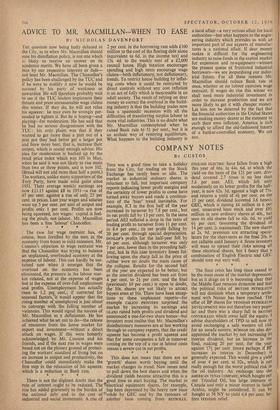COMPANY NOTES
BY CUSTOS, THIS was a good time to take a holiday from the City, for trading on the Stock Exchange has rarely been so idle. The market in industrial ordinary shares is reluctant to fall, but important company reports indicating lower profit margins and the certainty of lower profits to come have turned away buyers and made a continua- tion of the 'bear' trend inevitable. For example, ICI in the first half of the year increased its turnover by 7.8 per cent., but its net profit fell by 13 per cent. In the same period AEI suffered a drop in the ratio of trading profit to turnover from 11 per cent. to 8.4 per cent., its net profit falling by 20 per cent. through special depreciation. DUNLOP'S profits for the half-year fell by 60 per cent. although turnover was only 7 per cent. lower than in the preceding half- year, but in this case inventory losses fol- lowing upon the sharp fall in the price of rubber were no doubt the main cause of the collapse. Results for the second half of the year are expected to be better, but as the interim dividend has been cut from 4 per cent. to 2-4 per cent. and the final (previously 10 per cent.) is open to doubt, the 10s. shares are not likely to attract buyers even at 16s. There have been excep- tions to these unpleasant reports—for example CALICO PRINTERS surprised the market by increasing its earnings and GLAXO raised both profits and dividend and announced a one-for-two share bonus—but investors must realise that Mr. Macmillan's disinflationary measures are at last working through to company reports, that the credit squeeze has become a profit squeeze and that for some companies a fall in turnover coming on the top of a rise in labour costs means a severe cut in net profits.
This does not mean that there are no 'growth' shares worth buying until the market changes its trend. New issues tend to pull down the best shares and when the dividend yields become attractive this is a good time to start buying. The market in telectrical equipment shares, for example, has been depressed by the heavy new issue `"'made by GEC and by the rumours of another issue coming from REYROLLE. ENGLISH ELECTRIC have fallen from a high this year of 66s. to 44s. 6d. at which the yield on the basis of the 111 per cent. divi- dend covered 2.7 times is no less than 5.6 per cent. AEI, which fell only moderately on its lower profits for the half- year, is now 62s. 3d. against a high of 755. and returns a yield of 44 per cent. on the 15 per cent. dividend (covered 3.6 times). GEC, which is raising £6 million in 6 per cent. unsecured loan stock and over £84 million in new ordinary shares at 40s., has seen its old shares fall to 42s. 6d. to yield 64 per cent. (assuming the dividend of 14 per cent. is maintained). The new shares at 2s. 9d. premium are attracting specu- lators for the short-term as the final 20s. is not callable until January 4. Some investors will want to spread their risks among all these electrical shares, but I fancy that a combination of English Electric and GEC should turn out very well.
*
The Suez crisis has long since ceased to be the main cause of the market depression, but as it drags on it is becoming clear that the Middle East remains dynamite and that the political risks of BRITISH PETROLEUM will not diminish when a temporary settle- ment with Nasser has been reached. The offer of BP shares for TRINIDAD PETROLEUM DEVELOPMENT was not therefore very popu- lar and there was a sharp fall in BRITISH CONTROLLED which owns half the equity. I advise shareholders of TPD to sell now 10 avoid exchanging a safe western oil risk for an unsafe eastern. BURMAH on, also dis- appointed the market by not increasing its interim dividend, but an increase in the final, making 20 per cent. for the year against 171 per cent. (more perhaps if BP increases its interim in December) Is generally expected. This would give a yield of over 4 per cent. at 92s., which is not really enough for the worst political risk in the oil industry. An exchange into the AMERICAN TEXAS COMPANY, which bought out our Trinidad Oil, has large interests rn Canada and only a minor interest in Saudi Arabia, might be considered. It can be bought at 58 NY to yield 4.4 per cent, be- fore taxation relief.










































 Previous page
Previous page